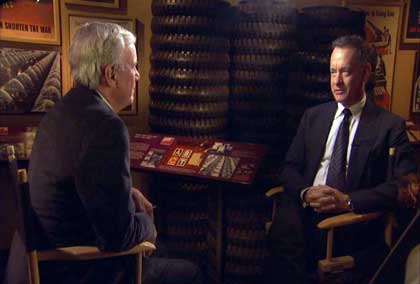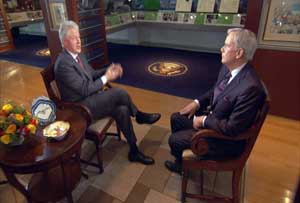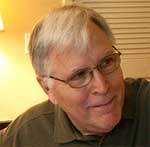 [Bianculli here: Contributing writer Tom Brinkmoeller not only watched an early cut of tonight's CNBC special by Tom Brokaw, but spoke to its executive producer. His report follows. But first: a personal, unrelated preface: Tonight at 7 ET, the Marlton, NJ Barnes & Noble, my neighborhood bookstore, is hosting a presentation/reading/signing where I'll show rare Smothers Brothers clips and, for one of the last times, push my book. If you're in the area -- Route 70E in Cherry Hill, just west of Route 73 -- please pop in. And now, to Tom's column about Tom...]
[Bianculli here: Contributing writer Tom Brinkmoeller not only watched an early cut of tonight's CNBC special by Tom Brokaw, but spoke to its executive producer. His report follows. But first: a personal, unrelated preface: Tonight at 7 ET, the Marlton, NJ Barnes & Noble, my neighborhood bookstore, is hosting a presentation/reading/signing where I'll show rare Smothers Brothers clips and, for one of the last times, push my book. If you're in the area -- Route 70E in Cherry Hill, just west of Route 73 -- please pop in. And now, to Tom's column about Tom...]
Brokaw Special Chronicles the Fizzle of Baby Booming
By Tom Brinkmoeller
With at least a couple of weeks of winter left and a ruthless jet stream that doesn't seem to want to back down, a lot of Americans must be thinking they're seen more snow than ever. But those blizzards may seem mild compared to an avalanche right around the corner: The first of the generation born between 1946 and 1964 turns 65 in January. Around 78 million baby boomers later, the last will retire.
That scary statistic, around for more than 40 years, has taken on a darker hue since the start of the recession. A feared, but expected, stress on the country's economic health has been trumped by unemployment, foreclosure, bankruptcy, spent savings and the recession's many other unwanted side effects. As a result, those people who once hoped for a better version of the golden age experienced by their parents happily now would settle for a chrome-plated later life.
In the '90s, Tom Brokaw spotlighted the greatest generation and more than justified that designation in his books and television specials. In 2008, in his book Boom!, he took a long look at how the greatests' children put their stamp on the 1960s. Tonight at 9 ET, he anchors a two-hour CNBC news special that takes a long, close look at what's coming for many of those who outspent their earnings and will outlive their savings. It's entitled Tom Brokaw Reports: Boomer$, and what it talks about is much more substantial than what the hokey use of the dollar sign in the title would suggest.
Just don't look for the answer to a problem that has years yet to unfold and don't expect to end the two-hour investment of your time with a feel-good glow. Unlike the hours of junk-food programming featured on its higher profile NBC cousin, this program isn't under a mandate to deliver empty calories. That undoubtedly is a reason the special isn't being shown on the big network -- where two straight hours probably hasn't been devoted to reporting since the end of the O.J. Simpson trial.
It's a small, not-very-seaworthy ship boomers find themselves in. Those who want to know a little bit more about sea conditions and where the life jackets are will find spending two hours in front of the set an educating experience. (CNBC will rebroadcast the program March 6 at 7 p.m., March 7 at 9 p.m. and March 8 at 8 p.m. -- all times ET.)

The luxury of more time helps to better lay out the issues and add depth through interviews with a wide range of relatively unknown to famous boomers. Former President Bill Clinton and actor Tom Hanks represent the latter group. Among the lesser-known but just as interesting are a Marine who was one of the last Americans to leave Saigon during the Vietnam War and who, at age 57, remains involved as a reserve officer; war protester David Harris, who went to jail over his beliefs, and the parents of Denise McNair, who was 11 in 1963 when she and three other children were killed in a KKK-engineered bombing of a Birmingham, Ala., church.
The program's senior executive producer, Mitch Weitzner, explained the cross-section of interviewees: "We were very careful to not paint (the generation) with too broad a brush. . . That they were all made from the same mold."
The program's predominant theme is uncertainty. There's the man who lost his six-figure job in 2008 and has only been able to get three interviews since. A cross-section group of University of Michigan 1973 graduates who talk with Brokaw about how their lives have changed from charmed to jinxed in the decades since graduation. There is a look at how debt, especially debt that arose from buying homes three times larger than the ones they grew up in, has played a significant part in revising the retirement rainbow.
"Never assume things will be better tomorrow than they are today," is a sentiment expressed by one participant. And when it's projected that as more baby boomers morph to geezer status, a third of all the money spent on goods and services will be on health care, that statement seems more like a warning than a regret.
When an interviewee asked Brokaw how he would characterize boomers, he answered "Unrealized."
The program ends with a hint of promise, or realization. Many boomers first made a big noise in the '60s, when their idealism clashed with established ways and ended up challenging and helping improve civil rights, equal rights and global politics. After two hours of chronicling the shift from "social activism to chronic consumerism," interviews show age and economics are shifting some boomers to reorder their priorities and put more value on families and relationships again. Just like their parents' generation did.
--

Tom Brinkmoeller, who was born just months before the start of the boom, will happily realize a goal characteristic of the times in a few weeks, when he turns 65 and finally can afford health insurance again -- more exciting, in perspective, than when he got a driver's license at 16.--